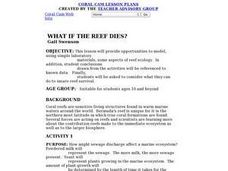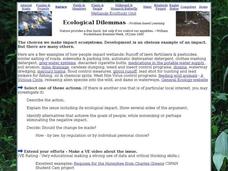Curated OER
Microbes in Long Island Sound
Students discover the harm and benefits of microbes. In this biology lesson, students explore water, nitrogen and carbon cycles. They investigate the factors affecting bacteria growth.
Curated OER
The Grand Canyon
Students act as scientists investigating the damming and experimental flooding of the Colorado River by the Glen Canyon dam that took place in 1996. They write a proposal as to whether or not more experimental flooding should be done on...
Curated OER
Environment: Rivers of Destiny
Students investigate the results of human intervention with the Mekong. Mississippi, and Amazon rivers. After watching a video about the status of the three rivers, they complete experiments demonstrating the effects of erosion and...
Curated OER
Desertification
Learners investigate the process of desertification in the Sahel region of Africa. They discuss photos from a National Geographic magazine, analyze the physical/political map of the Sahara, identify the causes and effects of...
Curated OER
Salt Marshes And Their Inhabitants
Young scholars investigate the ecosystem of the salt marshes. This is done in order to develop an appreciation for this type of environment. They conduct research using a variety of resources. Students are given samples of different...
Curated OER
Stanley Park and Aquarium Field Trip
Learners explore the beauty of British Columbia by participating in a class field trip. In this ecosystem observation lesson plan, students investigate the Vancouver Aquarium and Stanley Park, one of the largest parks in North America....
CK-12 Foundation
CK-12 Earth Science Concepts for Middle School
Explore a variety of science concepts in an interactive textbook created for middle school scholars. A lengthy table of contents takes readers to pages comprised of a subject overview, outline, and summary. Follow links further to find...
Curated OER
Hominid Diet
Students listen to an interview with Lucinda Backwell regarding fossil evidence that early hominids included termites in their diets. They participate in a discussion to investigate the significance of these findings.
Curated OER
Indiana Ice Investigations
Fourth graders create a model of the formation of Indiana by glaciers. Working in groups with appropriate materials, they create a model documenting how glaciers moved through the land and formed the geological structure and land masses...
Curated OER
Rock Cycle SIOP Unit
Students collect rocks, identify them, classify them, investigate their properties, and more. In this rocks lesson plan, students also experiment with soil and erosion and weather.
Curated OER
Reduce, Reuse, Recycle
Fourth graders discover the differences between: reduce, reuse, and recycle by performing hands on examinations. They list what would happen to the soil if we allowed the earth to wash away and briefly discuss the meaning of erosion.
Curated OER
Documenting Science Through an Active Inquiry Process
Students follow procedures regarding scientific data collection. In this scientific inquiry lesson, students investigate inquiry questions through research and data collection. Students use technology tools to create products that...
Curated OER
River Planning
Students use a model to conduct an experiment involving dam construction. Based on their observations, they draw conclusions about social, economic, and and environmental issues and make a decision concerning dam location. As a group,...
Curated OER
Forest Ecology
Students examine the different plants and animals in British Columbia. In this forest ecology lesson students explore how ecosystems work, classify animals and investigate food webs and chains.
Curated OER
Soil Management
Fourth graders examine different opinions on soil management. In this soil management lesson, 4th graders use a variety of resources to research how agriculture and the environment are related. They investigate cause and effect...
Curated OER
Let's Settle It!
Students investigate and record data about sedimentation rates. They make a sedimentation bottle using aquarium gravel, sand and potting soil. They discuss the sedimentation rates that they see in their bottles.
Curated OER
Cracked Marbles
Fourth graders determine how weathering, specifically ice, snow, and freezing water change the Earth's surface and rocks. After completing the investigations, they explain how heating and cooling expand and contract marbles until cracks...
Curated OER
UMNH: Cultural Clutter - Tales In The Trash
Fourth graders list three or more types of evidence of prehistoric cultures that encouraged archaeologists to investigate the marshes around the Great Salt Lake. They also explain why it is important not to disturb archaeological remains.
Curated OER
What If the Reef Dies?
Students complete four activities to investigate how reef ecology can change. They perform experiments to show how sewage discharge can affect a marine ecosystem, look at substances that don't dissolve in water, examine wave action...
Orange County Water Atlas
Location, Location, Location…
Young geographers discover not only how to read and recognize coordinates on a map, but also gain a deeper understanding of latitude and longitude and how climate changes can vary significantly across latitudes.
Curated OER
Doing a Lab Write Up
In this science worksheet, students examine the topic in order to solidify knowledge covered in the curriculum using puzzles and creative games.
Curated OER
Ecological Dilemmas in Wetlands
In this ecological dilemmas in wetlands worksheet, students select a topic, use the links to websites for research, describe the topic, explain its impact on wetlands, identify alternatives and decide on possible changes. An extension...
Curated OER
Prairie Restoration and Prairie Ecology
Students collect data as they identify and classify native prairie plants and insects. They create their own population study using a variety of sampling techniques to determine the population density of various species. Students...
Curated OER
Rock Cycles, Crayon Cycles
Students examine the rock cycle and the path that rocks go through to rearranged in different ways. They define key vocabulary terms, then in small groups conduct a variety of experiments using crayon shavings as simulated rocks and...

























